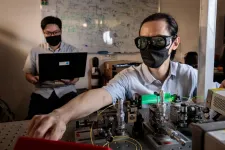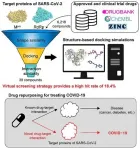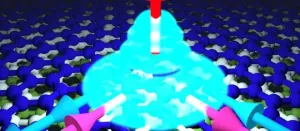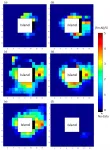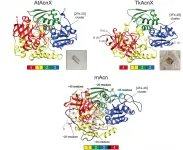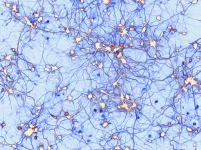Personalized tumor vaccines may solve tumor recurrence and metastasis challenges
2021-07-08
(Press-News.org) Thanks to the rapid development of nanotechnology, a research team led by Profs. NIE Guangjun, WU Yan and ZHAO Yuliang from the National Center for Nanoscience and Technology (NCNST) of the Chinese Academy of Sciences (CAS) recently designed personalized tumor vaccines based on bacterial cytoplasmic membranes and cell membranes from resected tumor tissue. This work was published in Science Translational Medicine.
Cancer vaccines are an effective anti-tumor therapeutic option that utilize tumor antigens to stimulate patients' immune response and specifically kill tumor cells. Postoperative recurrence and metastasis after surgery can thus be effectively inhibited by the activated immune system. Therefore, it is important for scientists and clinicians to find the best way to train the patient's own immune system to find these tumor cells.
Using surgically removed tumor tissue is a very attractive way for making a patient's own anti-cancer vaccine, since such a vaccine would contain the personalized antigen spectrum of the tumor cells. However, since there is only a small difference between the tumor antigens and the body's own proteins, the antigens may be recognized as "self" by the patients' own immune system. As a result, tumor antigens are more likely to induce antigen-specific tolerance than antitumor immunity.
Cancer immunotherapy faces the challenge of how to educate the immune system to distinguish tumor components as "non-self." Most of the time, bacteria are easily identified as invaders and cleared out by the immune system. Some researchers have tried to use bacteria or their components as adjuvants to enhance immunogenicity. However, nonspecific stimulation of the immune system by bacteria or their components may elicit severe side effects.
For example, lipopolysaccharides--large molecules found in the cell walls of Gram negative bacteria--may cause lethal cytokine storms. Therefore, it is critically important to develop powerful anti-cancer vaccines that educate patients' own immune systems to find cancer cells but do not induce side effects.
In this work, the research team designed a hybrid membrane nanovaccine for personalized immunotherapy to overcome the challenges described above. The tumor membrane antigens and bacterial inner membrane were fused and displayed on the surface of polymer nanoparticles. Introducing cytoplasmic membranes of E. coli, one of the most common bacteria in the human gut, into the hybrid membrane nanoparticle vaccines induced dendritic cell (DC) maturation, thus activating splenic T cells.
The hybrid membrane-coated nanoparticles represent a novel vaccine strategy that simultaneously delivers antigens and adjuvants to DCs to provoke robust innate and tumor-specific adaptive immune responses. In mouse tumor models, this strategy prevented tumor recurrence, with prolonged tumor-bearing animal survival and tumor-specific, long-term protection against tumor rechallenge.
In conclusion, this hybrid membrane-based antitumor immunity platform with intrinsic adjuvant properties offers a new opportunity for the development of individualized cancer vaccines for a broad range of solid tumors.
Prof. NIE's group has long been engaged in anti-tumor immunotherapy with nanotechnology. It developed nano-inhibitors targeting to two immune checkpoints through amphiphilic peptides (Nano Lett. 2018; J. Am. Chem. Soc. 2020), natural nano-vesicles with chimeric immune checkpoint PD1 antibody (OMV-PD1) through genetic engineering technology (ACS Nano 2020), click chemistry based on active lymph node accumulation vaccine system (Adv. Mater. 2021), and a personalized vaccine platform for tumor antigen delivery using genetic engineering technology along with peptide molecular glue technology (Nat. Commun. 2021).
INFORMATION:
[Attachments] See images for this press release:
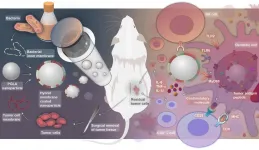
ELSE PRESS RELEASES FROM THIS DATE:
2021-07-08
Quantum key distribution (QKD) is a method for secure communication that uses quantum mechanics to encrypt information. While the security of QKD is unbreakable in principle, if it is incorrectly implemented, vital information could still be stolen by attackers. These are known as side-channel attacks, where the attackers exploit weaknesses in the setup of the information system to eavesdrop on the exchange of secret keys.
Researchers from the National University of Singapore (NUS) have developed two methods, one theoretical and one experimental, to ensure that QKD communications cannot be attacked in this way. The first is an ultra-secure cryptography protocol that can be deployed in any communication network that needs long-term ...
2021-07-08
Researchers at the National Human Genome Research Institute (NHGRI), part of the National Institutes of Health (NIH), have developed the Families Sharing Health Assessment and Risk Evaluation (SHARE) workbook, which helps people use their family history to assess their risk for heart disease, diabetes, breast cancer and colorectal cancer.
Since 2012, Laura Koehly, Ph.D., and her research team have measured the accessibility and usability of the workbook by working with communities and continually updating the workbook to address issues. Koehly is the chief of the Social ...
2021-07-08
A joint research group from KAIST and Institut Pasteur Korea has identified repurposed drugs for COVID-19 treatment through virtual screening and cell-based assays. The research team suggested the strategy for virtual screening with greatly reduced false positives by incorporating pre-docking filtering based on shape similarity and post-docking filtering based on interaction similarity. This strategy will help develop therapeutic medications for COVID-19 and other antiviral diseases more rapidly. This study was reported at the Proceedings of the National Academy of Sciences of ...
2021-07-08
Washington, DC (July 6, 2021) --The International Whaling Commission (IWC) was founded to regulate whaling. Today, it also increasingly focuses on the value of live whales for planetary health. A new workshop report confirms the great ecological value of whales to help mitigate climate change, transport nutrients, enhance marine productivity, and promote biodiversity in marine ecosystems.
The world's leading experts gathered for a three-day workshop in April that was co-hosted by the IWC and the Convention on the Conservation of Migratory Species of Wild Animals (CMS). The meeting came in response to a 2016 IWC resolution, introduced by the government of Chile, to compile scientific information about the ecological roles of cetaceans (whales and dolphins).
The workshop discussions ...
2021-07-08
Researchers at the National Cerebral and Cardiovascular Center in Japan show that excessive blood pressure reduction for acute intracerebral hemorrhage is risky in people with decreased kidney function
Suita, Japan -- Stroke and chronic kidney disease are both difficult to handle in their own rights, but having a stroke when your kidneys are already poor is more than just double the trouble. A new study led by Kazunori Toyoda at the National Cerebral and Cardiovascular Center (NCVC) in Japan shows that excessive blood pressure reduction for acute intracerebral hemorrhage can have dire consequences when kidney function is low. The study was published in the scientific journal Neurology®.
Intracerebral hemorrhage is a disease for which effective treatment is expected ...
2021-07-08
Rare-earth compounds have fascinated researchers for decades due to the unique quantum properties they display, which have so far remained totally out of reach of everyday compounds. One of the most remarkable and exotic properties of those materials is the emergence of exotic superconducting states, and particularly the superconducting states required to build future topological quantum computers. While these specific rare-earth compounds, known as heavy fermion superconductors, have been known for decades, making usable quantum technologies out of them has remained a critically ...
2021-07-08
A new study suggests sea discoloration data obtained from satellite images as a novel criterion in predicting if eruption looms for an underwater volcano.
There have been frequent eruptions of submarine volcanoes in recent years. The past two years alone recorded the explosions of Anak Krakatau in Indonesia, White Island in New Zealand, and Nishinoshima Island in Japan. Observing signs of volcanic unrest is crucial in providing life-saving information and ensuring that air and maritime travel are safe in the area.
Although predicting when a volcano will erupt can be difficult as each behaves differently, scientists are on the lookout for these telltale signs: heightened seismic activity, expansion of magma pools, increases in volcanic gas release, ...
2021-07-08
A pioneering cultivation strategy that recreates a mangrove environment in the lab has enabled identification of novel bacteria residing in Red Sea mangroves and will help improve understanding of mangrove ecosystem stability, resilience and sustainability.
Mangroves are highly productive, dominant coastal ecosystems that line between 60-70 percent of the world's tropical and subtropical coastlines. They harbor diverse microbial communities thought to make up 80 percent of the ecosystem's biomass. Many of the microbial species, families and taxa are unknown to science.
The cultivation strategy was developed by a team of KAUST researchers, including Fatmah Sefrji and Ramona Marasco.
"Red Sea mangroves are particularly interesting because they represent an extreme and unique ...
2021-07-08
The aconitase superfamily currently contains four functional enzymes including the archetypical aconitase (referred to as "other aconitase enzymes"), and one hypothetical aconitase X (AcnX). The aconitase enzymes catalyze the homologous stereospecific isomerization, and their three-dimensional structures and catalytic mechanisms including the [4Fe-4S] iron-sulfur cluster are very similar each other (Fig. 1a). Therefore, the aconitase superfamily (enzymes) is a typical example that is suitable for the so-called "recruitment hypothesis of enzyme evolution"; the gene duplication of multi-specific enzymes, followed by the narrowing of substrate specificity (ref. 1).
AcnX (subfamily) is further classified into "AcnXType-I" consisting of a single ...
2021-07-08
Researchers at The University of Queensland, working to gain a better understanding of how brain cells work, have discovered the underlying mechanism of a rare genetic mutation that can cause epilepsy.
Dr Victor Anggono from UQ's Queensland Brain Institute said his team made the ground-breaking findings while researching nerve cell communications, which are an important process in normal brain function.
''We're both excited and astounded to make such an important contribution to the field of cellular and molecular neuroscience,'' Dr Anggono said.
He stressed that the mutation was extremely rare, with only one reported case in the world to date.
Dr Anggono's team studied protein structures, called receptors, that ...
LAST 30 PRESS RELEASES:
[Press-News.org] Personalized tumor vaccines may solve tumor recurrence and metastasis challenges

